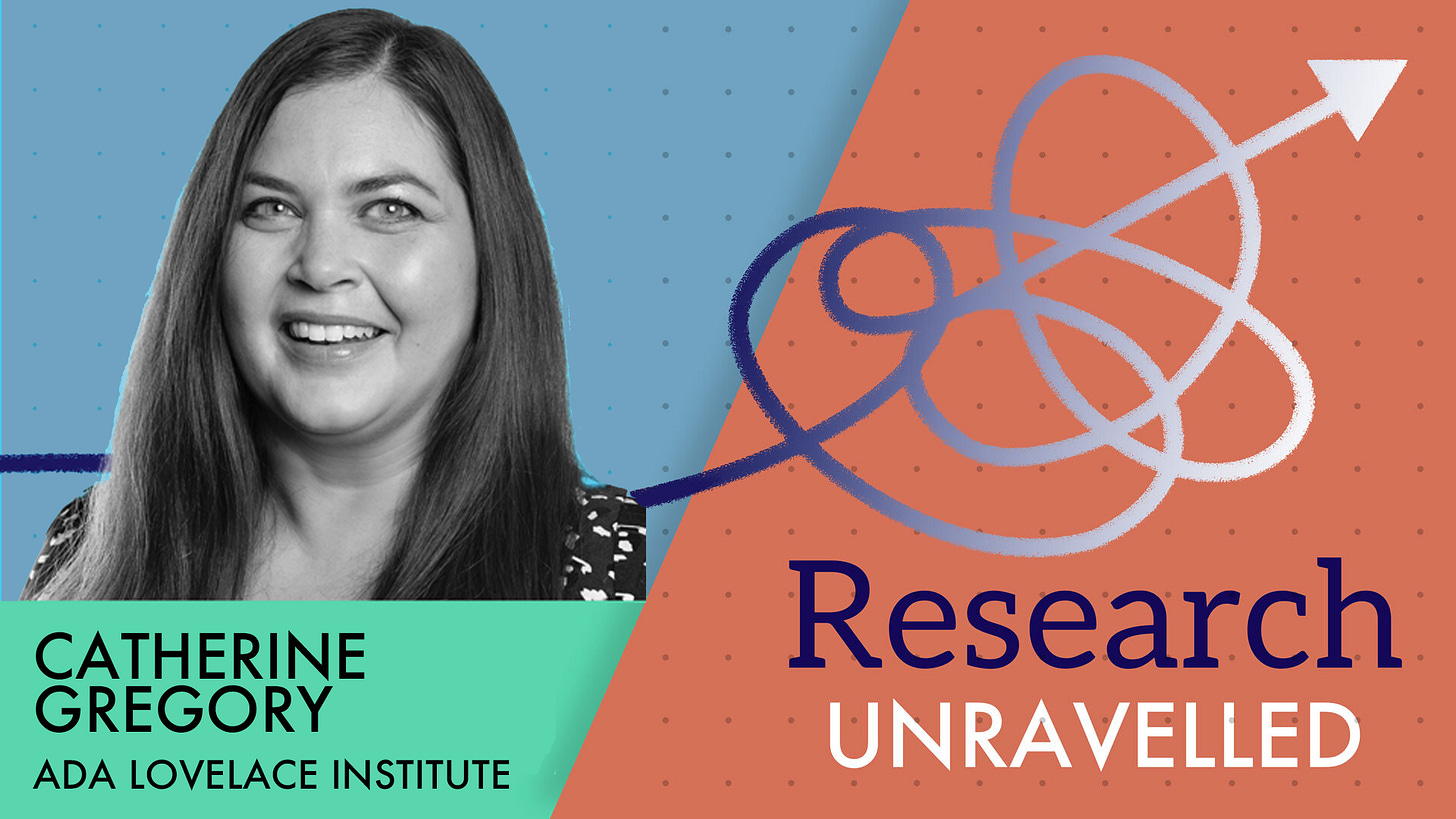"You have to embrace the awkwardness and discomfort. It's messy, right?"
Research Unravelled Episode 2: Ada Lovelace Institute's Catherine Gregory talks about the challenges of crafting a comms strategy in the rapidly evolving fields of AI and data.
Hello everyone,
Thanks for all your lovely messages of support about the Research Unravelled podcast over the past couple of weeks. We’re delighted to hear that it seems to be filling a gap in what’s out there, speaking directly to what one listener referred to as ‘our little corner of the comms world’.
Episode 2 is now live and features a fascinating chat between myself and the Head of Communications and Content at Ada Lovelace Institute: Catherine Gregory.
Ada Lovelace Institute is an independent research institute with a mission to ensure that data and AI work for people and society, and in our conversation we cover, amongst other topics…
How to craft consistent communications in a field that’s as rapidly evolving as AI and data?
Can we shift the narrative around AI from the perceived future existential risk that the technology poses to actual present day harms?
What are the best ways of making sure that messages resonate with policy makers?
Click on the link below to listen to the interview and subscribe to Research Unravelled.
As ever, we would like this podcast to benefit the whole research comms community but for that to happen we need your help.
So, once you’ve taken a listen, if you enjoyed what you heard, please consider taking one (or all!) of these actions.
Rate the podcast
Leave a review
Tell a colleague/friend about it
Share it on social media using #ResearchUnravelled
Thanks for listening,
Peter
How we unravel complexity
Orinoco Communications is a creative agency that specialises in helping research organisations.
Here are some of the ways we ensure that the best research has the impact it deserves.
Strategy - need help understanding your audience, their values, and how to reach them?
Content creation - are you looking for a video, animation or podcast to tell your story or disseminate your research?
Get in touch for a chat about how we can help you to communicate your research.
The below excerpt is just a short taster from the podcast - to benefit from the full range of Catherine’s insights you should listen to the whole episode…
Qu: What aspects of your work are especially complex?
Catherine Gregory: ‘We can really go back to basics with this and just talk about the definition of AI itself.
A definition of what you work on should seemingly be a very straightforward thing, right? But with AI, it is so rapidly evolving, it's hard to pin down. If we had to define AI a year and a half ago, pre ChatGPT, the definition would have been entirely different from what it is today.
And so I think that complexity, it introduces this tension and discomfort from a comms perspective, because if you think about an elevator pitch, for example, you really want to just have that nailed, have it be evergreen, and leave it alone. But with something like AI and data-driven technologies, it's not that simple and straightforward.
And so we've really had to reckon with this tension and and I think what it really comes down to is the fact that there's not one definition that is going to satisfy every context and satisfy every audience.
“In a complex and rapidly moving area like AI and data, you have to reevaluate your comms, messaging and definitions periodically.”
How do you unravel that complexity?
Catherine: ‘It's about acknowledging the limitations of the definitions up front, actually saying that it's a rapidly evolving area, there's not a universally accepted definition and then looking to our evidence base, ensuring that we're approaching the definition from a very Ada perspective, which for us is looking at the interaction between these technologies and people in society.
In a complex and rapidly moving area like AI and data, you have to reevaluate your comms, messaging and definitions periodically. It's not going to be something that's evergreen, it's not going to be something that's static.
That can be uncomfortable for comms teams, but I think you just have to embrace the awkwardness and discomfort. It's messy, right?’
‘When it comes to making tough decisions, when it comes to crisis communications, just go back to the strategy’
What’s one piece of advice you’ve been given in your career that you keep coming back to?
Catherine: For me, that's a really easy question. It is always go back to the strategy when in doubt. Go back to the strategy, go back to the mission - when it comes to making tough decisions, when it comes to crisis communications, just go back to the strategy. What does your organisation stand for? Who are the people that you're talking to? It's just a fundamental thing and it's helped me through lots of tough situations.
Can you recommend a book, film or podcast that’s inspired you?
Catherine: ‘My recommendation is a documentary, and it's not exactly about communication but it is the perfect example of using storytelling to illustrate a complex issue.
It’s a documentary called Daughters that’s on Netflix in the UK. It zooms in on a father daughter dance that is being held in a prison in Washington D. C. You see interviews with the fathers, you see the daughters outside of prison, living their everyday lives and the struggles that they're encountering.
That is the story that's being told, but it illustrates the systemic problems of racism, of poverty, of the prison industrial complex. And without being heavy handed and talking about these things in an academic way, it shows it through the stories of these actual human beings. It is so powerful and moving. And I think it's a really good comms lesson.’








